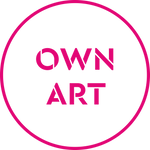Bold, colourful and empowering, Caroline Chinakwe's art has been turning heads around the world, and we're delighted to announce her work is now available at Enter Gallery. Speaking of what inspires her art, Chinakwe tells us:
“As a black female artist, my work is inspired by my personal experiences and the world around me. I strive to represent and honour different cultures in my pieces, challenge society’s narrow definition of beauty, and explore themes of race and social justice to empower the black community.”
In today’s blog, we’re chatting to Chinakwe to learn more about her unexpected transition into art from the world of fashion, her creative process and the issues that inspire her work…

Creative beginnings
After studying at the prestigious London College of Fashion, Chinakwe’s first foray into the creative industries started with the world of fashion. Although she worked in the industry for over 20 years, and tried her hand at everything from production to design, there was always something missing…
“I was good at it and even had my own label, but I just didn’t love it. They teach you to live and breathe fashion, and I was not living and breathing fashion, at all!”
It was while planning a Pop-Up event at Afro-lux boutique, Saboye, in East London in 2017, that Chinakwe first discovered digital collage:
“I had an idea for a flyer that I wanted to post on social media, but I didn’t know how to make it. My daughter told me there was an app that could do exactly what I wanted. At that point, I’d never used an app for anything! I remember getting home and rushing to get my phone so that I could create the image I had in my head.”
“I wanted to create art that represented me. All of the styling work I’d done up until this point was very western. Discovering this way of creating art allowed me to collage the way I wanted to style people, and the passion just grew.”

After a couple of years of posting these collages online, and telling an increasing number of people at fashion events who declared they loved her art that, “I’m not an artist, I’m a stylist,” she was asked by a friend whether she’d like to exhibit her work.
“People loved it and were buying prints. A friend of mine approached me and said they’d manage me if I wanted to become an artist. So, in 2019, I literally quit fashion and started working on the collection properly.”
This Is Me
While her transition from fashion to art wasn’t all smooth sailing, having found the passion she’d been searching for throughout her career, she persevered…
“2019 was one of the hardest years of my life. I knew when I decided to quit fashion that it was going to be a hard road, and it was going to be dark, but I knew that if I carried on, there would be a light at the end of the tunnel, and there was. No matter how hard it was, there was never a moment where I wanted to stop. I knew this was what I wanted to do. It’s funny, because if you’d asked me seven years ago if I liked art, the answer would have been ‘no’. It’s crazy how life just does its own thing.”


This determination led to her first collection, This Is Me. Chinakwe creates each piece by taking photographs of different items of clothing or jewellery, and hand-painting and drawing elements to play with textures, before digitally-arranging the final artwork. Speaking of the series and its inspirations, Chinakwe reveals:
“I called the collection This Is Me because it was literally me on a canvas. Back then, it was how I was dressing, how I wanted to style people, how I wanted my culture to be represented. A lot of the clothes and jewellery that were used to create the collection, were either my own personal possessions, or those of friends who worked in fashion. I would borrow them and redesign them for each piece. Each artwork is my styling on the canvas.”
“When I started naming the collection, phrases would just come into my head. For example, Let Go of Your Past, one of my most popular pieces, was almost like me letting go of fashion and everything before I’d started this journey. The series encapsulates who I was and what I was experiencing throughout that year as I worked on it.”

Colourism 2020
Chinakwe was well into an entirely different second collection, when 2020 arrived, and the world changed forever. She explains:
“When 2020 came and we went into lockdown, I started a new collection. I had about 10 pieces that my agent and I were really happy with, and then George Floyd was murdered and it changed everything.”
“I started really looking at how black people around the world were suffering and it made me think about what I could do about it with my work. I had a better understanding of the power of art and what it does, and realised I had an opportunity to tell proper stories and start conversations through my work.”


In her second collection, Colourism, Chinakwe raises awareness of how skin tone bias, particularly amongst the Black community, is still an issue that continues to hold people back.
“I don’t think racism can be eradicated, it’s just something we’re going to have to live with, like hate generally, but the way black people treat each other, and how we’re all very hung up on skin tone, is a major problem in society. The lighter you are, even amongst your own culture, the more attractive you’re perceived as, the more doors are opened for you. Growing up in Nigeria as a light-skinned girl, the way people would treat me was so different to how they would treat my dark-skinned sister – and it wasn’t racism, it was prejudice, it was skin tone bias.”
“The fact we’re still doing it to ourselves and how it's holding us back from growing and developing within our culture is so sad. This is why I decided to focus on colourism. I want people to recognise and acknowledge that it’s still happening. If we can’t eradicate racism, maybe we can at least eradicate colourism within our own culture. That could really help us moving forward.”

Power in Positivity
Speaking of what her work symbolises, and what she hopes people take away from it, Chinakwe tells us:
“You’ll see that a lot of my works feature bees, which goes back to my fashion days. I include the bees as a reminder of how much the fashion industry pollutes the world. They are a reminder to love beauty, love art and love fashion, but to also remember to think about the planet.”
Looking at Chinakwe’s models it’s impossible not to feel empowered by their uncompromising and defiant expressions. She reveals:
“Even though we might be talking about uncomfortable subjects, I want you to be able to look at the image and feel empowered, because these women are empowered. They’re strong, fearless women. They’re bold, courageous. They can take on anything. Whatever adversity arises, they will go through it.”
Explore our collection of works by Caroline Chinakwe here.




